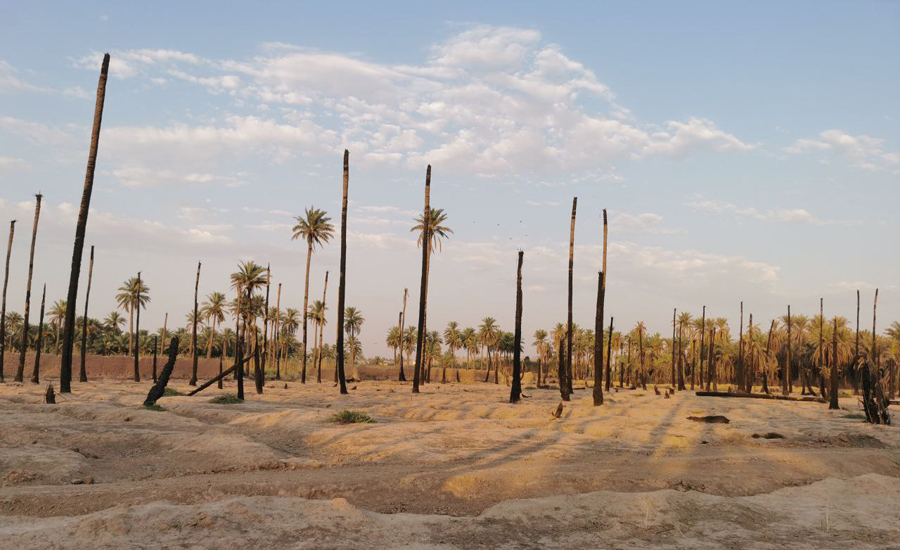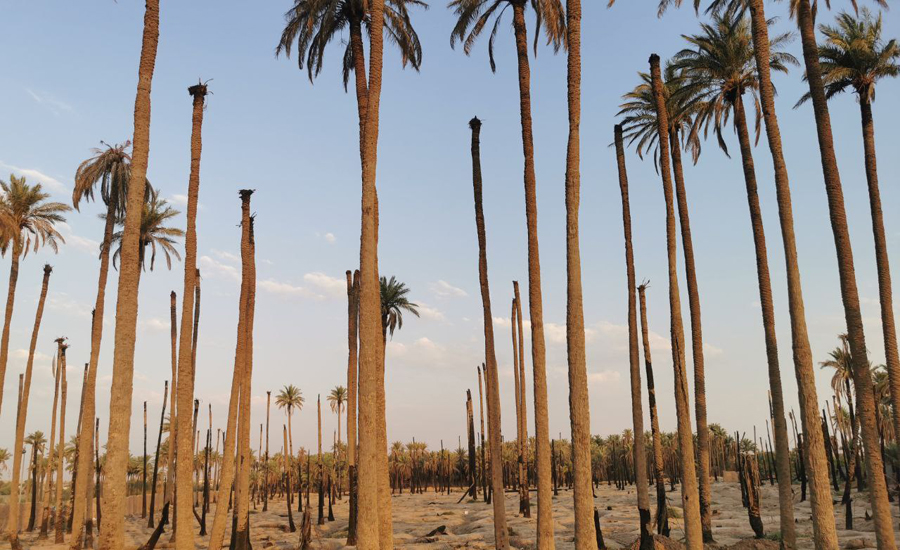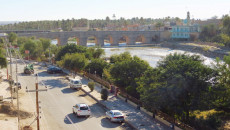Tens of farmers have turned their palm tree farms in Khanaqin, northeast of Baghdad, are cutting down and burning the trees in order to turn the farms it into residential areas without official permission of the government yet indirectly supported by influential figures in the region.
The local authorities believe they are in need of security forces to enforce law and stop the environmental catastrophe since some of the trees are 50-70 years old. Civic servants sigh that some casual cases has become a phenomenon all over the town.
Sarbast Birzo, a civil servant defending greenery in his hometown, said following 2003 ousting of Saddam Hussein regime, this process has started.
“In the last few years, it has become very popular. Khanaqin is running out of palm tree farms at the hands of the farmers and the government is careless,” Birzo passionately recalls the anti-environment campaign.
The directorate of agriculture in Kahnaqin has registered 1,254 donums (10 Donum= 1 hectare) of orchards and farms for its owners while 160 farmers have agricultural contracts with the government.
Kamaran Abdullah Nouri, director of agriculture in Khanaqin said 200 donums of farms has been burnt in the last four years and turned into residential areas.
Nouri says most of Khanaqin farms are located downtown as areas varies from 1-70 donums each.
200 donums of farms has been burnt in the last four years
KirkukNow has found out that in many cases, the farmers set fire stealthily and purposefully so that they are not held accountable by the government for draught, cut out and fire in the farms.
“We have data that shows 140 farms since 2017 were burnt and shifted into housing units. Plots are sold with support of local officials,” Birzo enthusiastically said.

Kahanqin, August 2021- In several occasions, palm trees in farms located downtown are dried and burnt deliberately to sell it as residential area. Laila Ahmed
The civic activists believe temperature is getting higher every summer in Khanaqin, passing 50 Celsius degrees at the peak, following the process of cutting out trees and whole farms flattened.
“Temperature in current summer is 9 degrees higher in the 1970s,” Birzo believes.
He sighs for the verities of palm trees in Khanaqin which embraces most of the 360 species planted all over Iraq
“It’s a national resource and instead of preserving it, it is eradicated since 80% of downtown farms are gone.”
It’s a national resource and instead of preserving it, it is eradicated since 80% of downtown farms are gone.
According to law for protection of agricultural lands number 3 of 2008, owners are not entitled to turn agricultural lands int residential unless approved by the government.
The law has supported Khanaqin directorate of agriculture to file lawsuits against the farmers.
Nouri said they have taken six farmers to court as each of them has eradicated their 15-donum farms and sold it as residential plots.
Owners of the farms taken to court or those involved in the process have denied to comment on the issue in fear that it might be used as evidence against them in court.
Salam Abdullah, a civil society activist, recalls that Khnaqin was well-known for its greenery and mild weather due to its many farms while “now it has turned into one of the hottest regions of Iraq as a plan is implemented to shift it int a desert, a process backed by well-connected people not only the farmers.”
Abdullah has arranged several protests to stop drying out farms but their pressure has not mounted into stopping the anti-environment process.
“The government has to empower law and stop violations and changing type of lands.”
One of Khanaqin palm tree farms.
Local officials believe the case has more than a dimension and all have to cooperate to stop selling farms.
“Stopping these violations requires big power and parties and enforcement of law because its very complicated,” said Aws Ibrahim, director of Khanaqin municipality.
Stopping these violations requires big power and parties and enforcement of law because its very complicated
Last Wednesday, a committee of municipality accompanied by police were trying to destruct a store built illegally in the neighborhood of Arkawazi in the district of Kahanqin.
The man built the store without any legal permission on a public property opens fire by Kalashnikov targeting the local committee of municipality but no casualties reported. Arrest warrant has been issued by local police.
Beside palm trees, Khanaqin is home to many farms of citrus such as orange, lemon, and other types of fruit but none was excluded from the process of deliberate drying, cutting out and burning.
Few farmers are still planting their farmers regularly as part of the town treasure and nature.
Mohammed Izzat has a 110-donum farm of palm trees, orange and lemon in Khanaqin. He recalls how his grandfather was sending the products of the farm by train to Baghdad and from there to Arab countries in the 1950s.
“This is a fortune from my father and grandfathers and I am never ready to eradicate it,” Izzat shows his passion for his farm and each tree of it.
He has allocated 13.5 donums for palm trees and collects six tons of dates a year.
Izzat blames the authorities for carelessness of the farmers. He says the previous Iraqi governments back before 2003 used to be supportive by spreading pesticide over the farms by jet while currently they provide no support.
He still urges his counterparts to not to eliminate greenery in return of money and the government to back the farmers.






